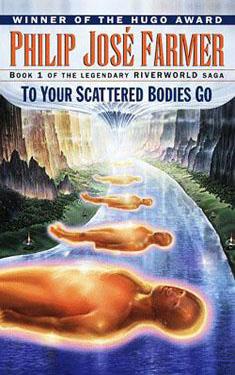GMRC Review: White Mars by Brian Aldiss
 Guest Blogger and WWEnd member, valashain, reviews science fiction and fantasy books on his blog Val’s Random Comments which we featured in a previous post: Five SF/F Book Blogs Worth Reading. Val has posted many great reviews to WWEnd and this is his eighth for the GMRC. Be sure to visit his site and let him know you found him here.
Guest Blogger and WWEnd member, valashain, reviews science fiction and fantasy books on his blog Val’s Random Comments which we featured in a previous post: Five SF/F Book Blogs Worth Reading. Val has posted many great reviews to WWEnd and this is his eighth for the GMRC. Be sure to visit his site and let him know you found him here.
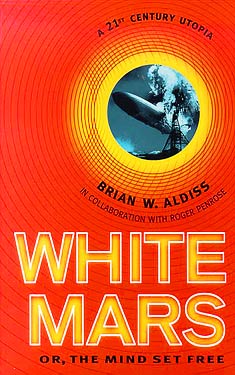 While rereading Kim Stanley Robinson‘s Mars Trilogy, books I consider to be among the very best in science fiction, I came across various references to White Mars Or, The Mind Set Free by Brian W. Aldiss, written in collaboration with prominent physicists Roger Penrose. Robinson’s utopian vision of a terraformed Red Planet is not something everybody would see as ideal or even morally acceptable. In the Mars Trilogy Robinson pays a lot of attention to the discussion between what he calls the Reds, a faction opposed to terraforming the planet and convinced of its intrinsic value, and the Green faction who would exploit the planet and make it more hospitable to human life. Aldiss (and Penrose) wrote this novel as a reply to Robinson’s vision of utopia portrayed in his Mars novels. The debate about how to set up a utopian society on Mars is the single most important topic in this book. As a nod to his source of inspiration, Robinson even had a street named after him. As far as I can tell White Mars is out of print, I had a hard time tracking down a useful copy without resorting to the countless torrents out there. After having read it, I can’t say I am terribly surprised by the relative obscurity of this book. The philosophical argument may be sound, as a work of literature Robinson’s novels are far superior.
While rereading Kim Stanley Robinson‘s Mars Trilogy, books I consider to be among the very best in science fiction, I came across various references to White Mars Or, The Mind Set Free by Brian W. Aldiss, written in collaboration with prominent physicists Roger Penrose. Robinson’s utopian vision of a terraformed Red Planet is not something everybody would see as ideal or even morally acceptable. In the Mars Trilogy Robinson pays a lot of attention to the discussion between what he calls the Reds, a faction opposed to terraforming the planet and convinced of its intrinsic value, and the Green faction who would exploit the planet and make it more hospitable to human life. Aldiss (and Penrose) wrote this novel as a reply to Robinson’s vision of utopia portrayed in his Mars novels. The debate about how to set up a utopian society on Mars is the single most important topic in this book. As a nod to his source of inspiration, Robinson even had a street named after him. As far as I can tell White Mars is out of print, I had a hard time tracking down a useful copy without resorting to the countless torrents out there. After having read it, I can’t say I am terribly surprised by the relative obscurity of this book. The philosophical argument may be sound, as a work of literature Robinson’s novels are far superior.
Since this novel is a reply to Robinson’s work I find it very difficult not to see it in the light of the Mars Trilogy. In fact, when I first heard about the novel I questioned the wisdom of trying to cover ground Robinson had already so thoroughly explored. No matter how unfair it may be to compare books of different authors to each other, this novel practically begs for it. I’m not sure how much sense this review will make if you have not read Robinson’s novels. You have been warned.
GMRC Review: Rendezvous with Rama by Arthur C. Clarke
 Jeremy Frantz (jfrantz) reviews SF/F books on his blog The Hugo Endurance Project where he has given himself just 64 weeks to read every Hugo Award winner. This is his seventh GMRC review to feature in the blog.
Jeremy Frantz (jfrantz) reviews SF/F books on his blog The Hugo Endurance Project where he has given himself just 64 weeks to read every Hugo Award winner. This is his seventh GMRC review to feature in the blog.
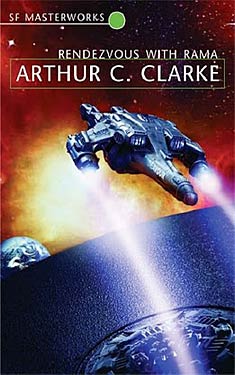 When a ten trillion ton asteroid wanders into the solar system, you take a second look. And when that asteroid turns out to be massive alien spacecraft, you really start to pay attention. This is precisely what happens in Rendezvous with Rama when the crew of the Endeavor ventures to board the vessel and unlock it’s secrets, whatever they may be.
When a ten trillion ton asteroid wanders into the solar system, you take a second look. And when that asteroid turns out to be massive alien spacecraft, you really start to pay attention. This is precisely what happens in Rendezvous with Rama when the crew of the Endeavor ventures to board the vessel and unlock it’s secrets, whatever they may be.
Did I just get smarter?
Of the two titles I’ve read, and especially in the case of Rama, I’ll say that Arthur C. Clarke has an interesting style. There were some truly slow passages, yet it was never boring. There were also some adrenaline fueled moments (including a fun spin on the classic defuse the bomb trope) but even at its most exciting it never stops feeling…clinical. The combination made Rama at once a fast-paced and just plain old fun-to-read book, but it also felt very deliberate, serious and real. You have fun and even feel a little…I don’t know, smarter for having turned the pages? I mean, it’s not that strange an idea, Clarke’s name is practically synonymous with excellence in science and Science Fiction literature.
Cloud Atlas on the Silver Screen
I’m not at all familiar with Cloud Atlas, by David Mitchell, but this trailer looks amazing and makes me want to read the book. I love a sweeping story across time and the visuals and cast are hitting all the right buttons for me. What do you think? Have you read the book?
The film’s website provides a wealth of information concerning the different characters throughout the timelines in the film. It will premiere at the Toronto International Film Festival in AMC Theatres on October 26th.
Why I Want to See Neuromancer: A Confession
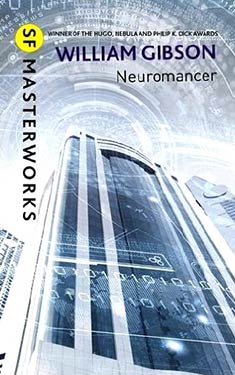 This is a little embarrassing to admit. I didn’t totally understand Neuromancer. It’s a great novel. It garners 4 out of 5 stars by the 300 WWEnders who have read it, which I assume means they grasped it better than I did. Don’t get me wrong, though. I did enjoy reading it (Gibson has a beautifully poetic writing style), but I think I may have read it too quickly. Life in cyberspace, after all, is inherently esoteric. He’s describing techology that didn’t exist yet, so his names for everything are different from we might call them now.
This is a little embarrassing to admit. I didn’t totally understand Neuromancer. It’s a great novel. It garners 4 out of 5 stars by the 300 WWEnders who have read it, which I assume means they grasped it better than I did. Don’t get me wrong, though. I did enjoy reading it (Gibson has a beautifully poetic writing style), but I think I may have read it too quickly. Life in cyberspace, after all, is inherently esoteric. He’s describing techology that didn’t exist yet, so his names for everything are different from we might call them now.
That is why I’m more interested in the upcoming movie than I usually would be. I don’t just want to see a great book recreated on the silver screen….I want to see what the hell it was all about! Recently, it’s been revealed that Mark Wahlberg and Liam Neeson have been tapped to help explain this novel to me.
Read Total Recall for 99¢ on Kindle
Yes, we know. This remake is slap in the face to the Ahnold. Even director Len Wiseman seems a little sheepish about it in his latest interview. Just remember, even the “original” Schwarzenegger engine wasn’t an original, either. It was an adaptation, of course, of Philip K. Dick‘s classic short story, We Can Remember It for You Wholesale. Before you see the movie, read it! To commemorate the release of the new film, Amazon has released the story under the latter day title, Total Recall.
GMRC Review: The Big Time by Fritz Leiber
 Guest Blogger and WWEnd Member, Charles Dee Mitchell, has contributed a great many book reviews to WWEnd including his blog series Philip K. Dickathon and The Horror! The Horror! He can also be found on his own blog www.potatoweather.blogspot.com. This is Dee’s fifth GMRC review to feature in our blog.
Guest Blogger and WWEnd Member, Charles Dee Mitchell, has contributed a great many book reviews to WWEnd including his blog series Philip K. Dickathon and The Horror! The Horror! He can also be found on his own blog www.potatoweather.blogspot.com. This is Dee’s fifth GMRC review to feature in our blog.
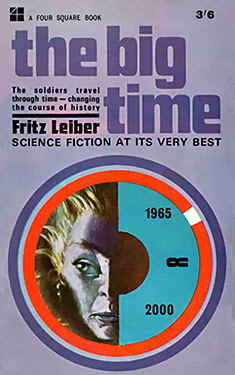 The universe is at war. Leiber’s short novel is set, on one level, in the later part of the 20th century, but it seems that war has been going of forever. Here is how Greta Forzane, our narrator, states things.
The universe is at war. Leiber’s short novel is set, on one level, in the later part of the 20th century, but it seems that war has been going of forever. Here is how Greta Forzane, our narrator, states things.
“This war is the Change War, a war of time travelers – in fact, our private name for being in the war is being on the Big Time. Our soldiers fight by going back to change the past, or even ahead to change the future, in ways to help our side win the final victory a billion years or more from now. A long, killing business, believe me.”
Greta is an entertainer at The Place, a self-enclosed environment outside space and time. Solders fresh from battle follow the change winds and arrive for medical assistance and some R&R. Picture a USO with freer alcohol and relaxed sexual attitudes. Advanced technology provides state-of-the art medical treatment and sex partners to suit every fancy. If a visiting soldier does not take to one of the on-staff entertainers, or if his alien anatomy causes complications, he can always choose from the hundreds of ghost girls kept folded into envelopes in the storage area. (It would slow things down at this point to attempt an explanation of ghost girls.)
Life at The Place doesn’t seem all that bad, although it could get a bit boring since it goes on more or less forever. But those who run the place see old friends returning from battle on a regular basis, and they stay occupied with their own intrigues and affairs. They have only to wait for their maintainer, the device that keeps The Place intact outside of space and time, to start flashing its blue lights. That’s the sign that the change door is about to open and new arrivals or possibly old friends will come crashing through.
GMRC Review: Divide and Rule by L. Sprague de Camp
 Chris Uhl (chuhl) can’t remember a time when he wasn’t a science fiction fan. He has a B.A. in Classics from Vassar College and an M.A. in English Literature from the University of Virginia. He has worked as a teacher, a legal assistant, a college development officer, a salesman, and a film extra. Chris may be the only WWEnd reviewer who has no blog. This is his first GMRC review to feature in the WWEnd blog.
Chris Uhl (chuhl) can’t remember a time when he wasn’t a science fiction fan. He has a B.A. in Classics from Vassar College and an M.A. in English Literature from the University of Virginia. He has worked as a teacher, a legal assistant, a college development officer, a salesman, and a film extra. Chris may be the only WWEnd reviewer who has no blog. This is his first GMRC review to feature in the WWEnd blog.
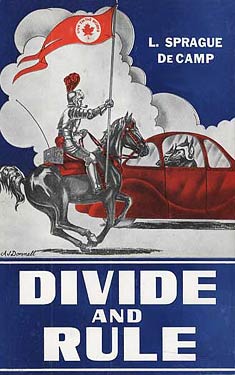 When I saw the synopsis of L. Sprague de Camp‘s Divide and Rule, I knew I had to read it. It takes place in the 23rd century in Poughkeepsie, NY. Poughkeepsie happens to be my hometown, and during my Junior Year Abroad in England, they actually called me “the Duke of Poughkeepsie.” So this is my story.
When I saw the synopsis of L. Sprague de Camp‘s Divide and Rule, I knew I had to read it. It takes place in the 23rd century in Poughkeepsie, NY. Poughkeepsie happens to be my hometown, and during my Junior Year Abroad in England, they actually called me “the Duke of Poughkeepsie.” So this is my story.
Assuming, of course, that I survive to the 23rd century, when the Hudson Valley, like the rest of the planet, will be conquered by “hoppers,” aliens who look like oversized kangaroos. The hoppers will ban high tech and reduce America to a state of medieval feudalism. As if that weren’t bad enough, Poughkeepsie will be at war with Danbury, CT over high tolls. So it looks like I’ll have my work cut out for me.
The point of the story is the juxtaposition of the medieval and the modern. When these New Yorkers talk about the new model Ford, they’re not talking about cars, they’re talking about suits of armor. And they use 20th-century American slang to describe their chivalric adventures.
The problem for me at first was that de Camp doesn’t delve too deeply into the implications of this society beyond the bare description. It’s an interesting setup – let’s explore it! It’s fun to bandy around names like Baron Peekskill and hear about knights fighting at the Battle of Mt. Kisco, but once the novelty of medieval New York wears off – and I would think that the novelty would carry me along further than most readers – then what? The juxtaposition between the medieval and the modern loses its impact when the “modern” now seems a bit quaint to the contemporary reader.
The story starts to fall between two stools – not quite satisfying as science fiction or as historical novel – and like a knight it full armor, it has trouble getting up again.
But it does rise up, when our hero finds himself forced to kill a hopper to defend himself and a damsel in distress. In a nicely-observed description of the moment immediately afterwards, DeCamp writes:
“Sir Howard leaned on his sword, waiting for the roaring in his ears to cease. He knew that he had come as near to fainting as he ever had in his life. A few feet away lay the hopper’s head, the beady eyes staring blankly. The rest of the hopper lay at his feet, its limbs jerking slightly, pushing the sand up into little piles with its hands and feet. Blue-green blood spread out in a widening pool. A few pine needles gyrated slowly on its surface.”
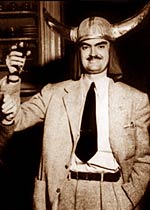 From that moment on, there’s no going back, and the story gains new power as our feckless knight-errant changes into a man with a purpose.
From that moment on, there’s no going back, and the story gains new power as our feckless knight-errant changes into a man with a purpose.
Divide and Rule is dedicated “To Bob Heinlein,” and I imagine that Heinlein must have been pleased with the offering. It’s his kind of story, with scrappy, pragmatic characters getting their political education at the hands of a didactic, Wise Old Man. But the resistance leader in this story is a gentler, more patient man than the cantankerous gurus of Heinlein.
And Sir Howard is a bit like the protagonist in a Heinlein juvenile. He’s a mature adult, but intellectually and politically he’s been kept in a state of arrested adolescence by his alien overlords. Once his consciousness is raised, though, he’s quick to make up for lost time, and so is de Camp.
GMRC Review: All the Lives He Led by Frederik Pohl
 New WWEnd member, Ellie Bogomazova (alchymyst), is a bookseller, geek, gamer and reader of all things sci-fi and fantasy. She works at Politics and Prose bookstore in Washington, DC, and reviews books on her brand new blog Spacetalkers From Outer Shelf. Speaking of new, Ellie has just started on the GMRC and this is her first review.
New WWEnd member, Ellie Bogomazova (alchymyst), is a bookseller, geek, gamer and reader of all things sci-fi and fantasy. She works at Politics and Prose bookstore in Washington, DC, and reviews books on her brand new blog Spacetalkers From Outer Shelf. Speaking of new, Ellie has just started on the GMRC and this is her first review.
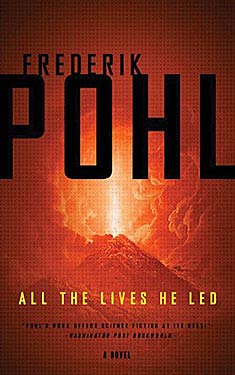 I think it’s a little strange to start reading Frederik Pohl with his latest book, All the Lives He Led. After all, the man has been writing award-winning sci-fi since way before I was born. And after reading this book, I realize this is also not perhaps the best introduction to Pohl’s work, because unless you know about Frederik Pohl’s track record and are determined to read more of him, this book alone would not inspire you to do so.
I think it’s a little strange to start reading Frederik Pohl with his latest book, All the Lives He Led. After all, the man has been writing award-winning sci-fi since way before I was born. And after reading this book, I realize this is also not perhaps the best introduction to Pohl’s work, because unless you know about Frederik Pohl’s track record and are determined to read more of him, this book alone would not inspire you to do so.
The main character is Brad Sheridan – born into a well-to-do family, his fortunes change with the eruption of a super-volcano in Yellowstone that covers half of United States with ash. Brad’s family loses their fortune and moves to a refugee camp on Staten Island. Brad grows up committing petty crimes and getting mixed up in shady deals. He then signs up as an Indentured person and moves first to Egypt, then to Pompeii, to work at what is now a tourist theme park, complete with Roman currency, people selling Roman wine and food, and the city rebuilt via virtual reality.
At its core, the story is a thriller set in a dystopia – terrorism is common world-wide, with attacks happening virtually every day; people start dying of a mysterious disease nicknamed Pompeii Flu; Brad’s girlfriend, a mysterious and beautiful woman named Gerda, disappears without a trace; his coworker is found dead. And yet despite all these things happening, the story just seemed rather boring. Perhaps it is because Pohl’s writing seems ill-suited to the thriller genre and does not convey a sense of suspense and mystery. Perhaps it is the characters. Brad is extremely difficult to sympathize with. He is not likeable or smart – he is a pretty crude (for lack of a better word) guy, especially in the way he talks about women. He is also, despite having grown up in a rough environment, somewhat lacking in street smarts – he talks about things he probably shouldn’t talk about, fails to observe the fairly obvious. 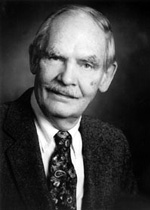 His pining for Gerda does not elicit any sympathy either and actually starts grating on reader’s nerves after a while. The problem also is that Brad is one of those main characters who has things happening to him rather than making things happen. This, unfortunately, makes for a very shallow story – there is a multitude of events and characters, but the only way we know what is happening is to read about Brad’s reactions to all these events.
His pining for Gerda does not elicit any sympathy either and actually starts grating on reader’s nerves after a while. The problem also is that Brad is one of those main characters who has things happening to him rather than making things happen. This, unfortunately, makes for a very shallow story – there is a multitude of events and characters, but the only way we know what is happening is to read about Brad’s reactions to all these events.
This is obviously a work of a writer with many novels under his belt, because even despite the unsympathetic character and at times slow action, you keep reading, because the narrative is just so smooth. It is a good read, but it does not read like Pohl’s best work.
This one gets 2 denarii out of 5 from me. Never fear, I will read Pohl’s other stuff (a copy of Gateway is on my nightstand).
GMRC Review: To Your Scattered Bodies Go by Philip José Farmer
 Jeremy Frantz (jfrantz) reviews SF/F books on his blog The Hugo Endurance Project where he has given himself just 64 weeks to read every Hugo Award winner. This is his sixth GMRC review to feature in the blog.
Jeremy Frantz (jfrantz) reviews SF/F books on his blog The Hugo Endurance Project where he has given himself just 64 weeks to read every Hugo Award winner. This is his sixth GMRC review to feature in the blog.
Sir Richard Francis Burton died in 1890. He was resurrected along with every other human being that ever lived, hairless and naked in a vast river valley on an unknown planet in an unknown time. Burton eventually bands with an unlikely group which includes a prehistoric Neanderthal, an adolescent girl, an alien from Tau Ceti and a number of others from varying places and times. Armed each with a towel and “grail” (I pictured a metal trash can that provides food and supplies when placed under a mushroom shaped “grailstone”), the group sets out to find out what exactly is going on.
Strange fruit
The best way I can describe this first installment in Philip José Farmer’s Riverworld Saga is to say that it is ripe. With people from all times and places resurrected in one place, an epic river adventure, mass promiscuity and some gratuitous violence, what could possibly be off limits? Within just four short chapters of beginning this book, the juice of possibility was dripping down my arm like an over-ripe peach.
Leaning heavily on all that is possible, the story eventually develops a good head of steam which culminates in a river battle with a group of slaveholders led by none other than Herman Göring. To that point, there had been something Zelazny-esque about the journey that despite little more than a vague conception of the goal or possible outcome, nonetheless moves forward determinedly and is punctuated by alternating periods of despairing self-examination and then of ultra-violence.
Like Zelazny’s Hugo winners, the more that is uncovered along the way, the more questions readers are left with, which creates a kind of slow building and eventually snowballing tension that could have no other outlet than a violence that would have you convinced that real people fought and died. The river battle with Göring’s minions is sweaty, bloody, disturbing and represented the high-point in the book for me.
GMRC Review: Hothouse by Brian W. Aldiss
 Long time WWEnd member and Uber User, Emil Jung, is an obsessive SF/F reader and as such he’s become a huge supporter of WWEnd. (We often refer to him as our “South African Bureau.”) Besides hanging out here, Emil writes poetry on his blog emiljung.posterous.com. This is the fifth of Emil’s GMRC reviews to feature in our blog.
Long time WWEnd member and Uber User, Emil Jung, is an obsessive SF/F reader and as such he’s become a huge supporter of WWEnd. (We often refer to him as our “South African Bureau.”) Besides hanging out here, Emil writes poetry on his blog emiljung.posterous.com. This is the fifth of Emil’s GMRC reviews to feature in our blog.
 In the late 1960s Brian W. Aldiss became known as part of the New Wave in British science fiction, along with J. G. Ballard, whose The Drowned World shares some common themes with Hothouse. He remains a major voice in SF, and his history of the genre, Billion Year Spree, is still referred to by literary critics and fans alike. A fascinating observation is that almost all of his novels are narratives of exploration in one way or another, with the possibility of personal enlightenment open to the protagonists. Hothouse is no different.
In the late 1960s Brian W. Aldiss became known as part of the New Wave in British science fiction, along with J. G. Ballard, whose The Drowned World shares some common themes with Hothouse. He remains a major voice in SF, and his history of the genre, Billion Year Spree, is still referred to by literary critics and fans alike. A fascinating observation is that almost all of his novels are narratives of exploration in one way or another, with the possibility of personal enlightenment open to the protagonists. Hothouse is no different.
What is today known as a full-length novel was first published in 1962 as various short stories. It was only in 1976 that the novel was published in its entirety. It is often referred to in blurbs on the various editions as “The Hugo Award winning novel,” but a close scrutiny of the Hugo Award winning novels reveals no such entry. That’s because the five stories that make up the novel, as a collection, won the 1962 Hugo Award for best short fiction, published in the following sequence in The Magazine of Fantasy & Science Fiction, from February to December 1961:



















 Full Details
Full Details
